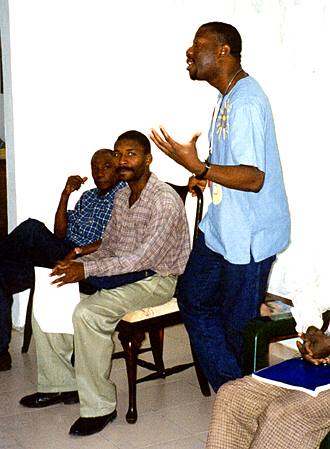| By
Michael Wacht
LAKELAND — Some members and pastors of the
Methodist Church of Haiti believed the Methodist Church was an
isolated church in Haiti, according to the Rev. Jacques Pierre.
“A villager in Haiti knows about the Methodist
church in his area,” Pierre said. “He knows about the Methodist
Church in Haiti and…in the Caribbean. They have not been taught the
history of Methodism or how Methodism is a worldwide movement.”
That belief has begun to change in part because
of efforts by members of the Florida Conference who sponsored and
participated in the Institute of Preaching in Haiti. The Institute was
held in two sessions, one in March and the other in April, in two
different areas of Haiti.
“By receiving funds and guests to help them
and be in ministry with them, they had a taste of that connection in a
tangible way,” Pierre said. “They are part of a much larger
Christian movement…who are in ministry with them and connected to
them through this ministry in Christ’s name.”
The Institute of Preaching is an annual event in
the Florida Conference. It is funded by an endowment given by Mr. and
Mrs. Frank Sherman, United Methodists from Florida who believed in “good
Biblical preaching,” according to the Rev. Dr. Gene Zimmerman, a
retired pastor and chairman of the Institute of Preaching committee.
The Shermans’ original gift of $350,000 was
invested and has increased in value, which has allowed the committee
to begin exporting the Institute, according to Zimmerman. Nearly 10
years ago, the Florida Conference started offering scholarships to its
own institute to pastors from the Methodist Churches in the Bahamas.
Three years ago, Florida gave $8,000 to the Methodist Church of Cuba
to go toward a Spanish-language Institute for more than 135 pastors
and their spouses.
“The first [Cuban] Institute was the first
time the ministers and their wives were together at a retreat,”
Zimmerman said. “It’s something they can’t afford.”
The Haitian Methodists also requested $8,000 to
cover transportation and meals for pastors and travel costs for
teachers.
Among the teachers were four Florida Conference
pastors, including Pierre and the Revs. Linda Standifer, Luc Dessieux
and Montreuil Milord. Dessieux and Milord helped with workshops and
worship. Pierre focused on divine grace and human response from a
Wesleyan tradition, and Standifer taught pastoral care.
“Pastoral care is a pressing need,” Pierre
said. “Most of the pastoral duties are performed by lay pastors who
have no theological training. They are not only burying the dead, but
helping the family cope with grief. Receiving training…was very
valuable to them.”
Another aspect of the training was how to do
ministry in the Haitian context. “Theological activities don’t
take place in a vacuum,” Pierre said. “They take place in the
context of the reality people are facing everyday.”
The reality of the Haitian people is political
instability, uncertainty, a lack of safety and employment, and
inadequate schools and universities, Pierre said. Haiti has mandatory
and free education through high school, but the government does not
have the resources to provide schools. The private sector is taking
over education, but many people cannot afford to send their children
to a private school.
“This is why education is an integral part of
the Methodist Church in Haiti,” he said.
Churches offer schooling with low tuition costs
to the people in their area. “But when people can’t afford the
tuition, the churches still provide education,” Pierre said. “Ministry
and social justice go hand-in-hand in the Methodist Church of Haiti.
Without both, the Methodist Church of Haiti would not be relevant to
the suffering and need of the people of Haiti.”
|

|
|
Photo by the Rev. Linda Standifer |
| The Rev. Jacques Pierre (center standing), a native of Haiti and Florida Conference pastor, gives the morning devotion at the recent Institute of Preaching in Port Au Prince, Haiti. "Students are hungry for food, but hungrier for the training," the Rev. Linda Standifer said. |
|